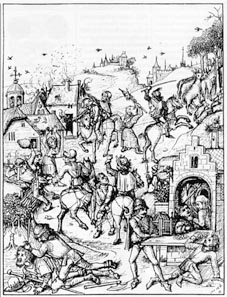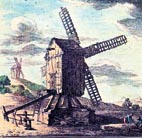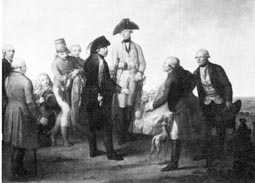












The history of the Friesacker Ländchen started with the youngest Ice Age roughly 20.000 years ago. Melting ice created enormous glacial valleys from which so-called Ländchen (land) protruded, so also the Friesacker. Archaeological finds at the upper Rhin indicated that on the mounts in the Luch Ice Age fisher and huntsmen settled already 5.500 – 3.500 before our time. Until the 3rd century Germanic tribes lived in the area then Slavic people as finds near Senzke proof. Many village names go back to Slavic times. Saxon and Franconian armies run unsuccessful again and again against Slav borders. Under Albrecht the Bear in the year 1147 an enormous army gathered for the fight against Ljutitzen in the Mittelmark. In an fanatic zeal for faith the greater part of the Slavs was wiped out, their villages burned down, the fields ruined. To fill the swath of destruction with again people Margrave Albrecht recruited colonists from Friesland, Holland and Westphalia. During the expulsion of the Slavs, the knights of Bredow must have distinguished themselves because Albrecht gifted Arnold von Bredow a few Slavic settlements. The Bredows enlarged their estate through thieving, wayside robberies and town lootings and if that wasn't enough a clever marriages provided soon Friesack and the villages Brädikow, Warsow, Vietznitz, Senzke, Haage, Wutzetz and Wagenitz including surrounding forests and meadows.

A legend describes the wondrous land reclamation at the Rhin like this: The devil surveyed once again the earth, put all disreputable noble people into his big sack and flew off. But there were so many that the Lord of hell had problems to lift of. The sack touches a steeple over Friesack and the noble people cried horrified: 'Loch to, Loch to'. But a Bredow fell out and called the village he wanted to build Lochow. The devil flew on and more Bredows fell out. Happily and relieved to have escaped the purgatory they called: 'Frie ut`n Sack', and named the village Friesack. Another person wanted to jump out. The other noble people screamed: 'Wags nit'. Still he dared to jump and founded, where he fell, the village Wagenitz. As not all of the Bredow masters could stay in Friesack, they travelled in different direction into the Havelland. The oldest brother stayed in Friesack and said to the second one: 'geh beß hin' and he then named the place where he settled Beßhin, Pessin. The third one walked inland and founded Landin, the forth one walked the same way and called his village Selbelang. The fifth brother turned right too and built Retzow.

The last brother finally settled near Nauen and gave the place his name: Bredow.
Not the Bredow masters built the villages and cultivated the land but the day labourer and peat-cutter, the farmer and craftsmen. Fertile land was reclaimed in centuries from forests and the Luch. Since the 14th century the drainage of the Rhin-Havel-Luch has been a challenge for its people till today. The reasons were quite different fro the respective masters. Frederick II also wanted land for potato growing but most of all peat as heating material for Berlin via the then still navigable Rhin and in GDR times meadow production for cattle herds as 'milk vein for Berlin'. So a countryside was created, trenched by the Rhin, ditches and canals with old quaint villages, which gave many new settlers land and accommodation after the last war. These are energetic communities, whose population created liveable villages and love the tranquil and dry beauty of their Friesacker Ländchen, their home. A countryside, formed by soft harmonic passages, muted in form and colour with wide views over fields, meadows, moors, pastures up to the woods.
The pictures + contents of this page were kindly made available by
Stadtmagazinverlag AS GmbH.
Photo: Stadtmagazinverlag AS